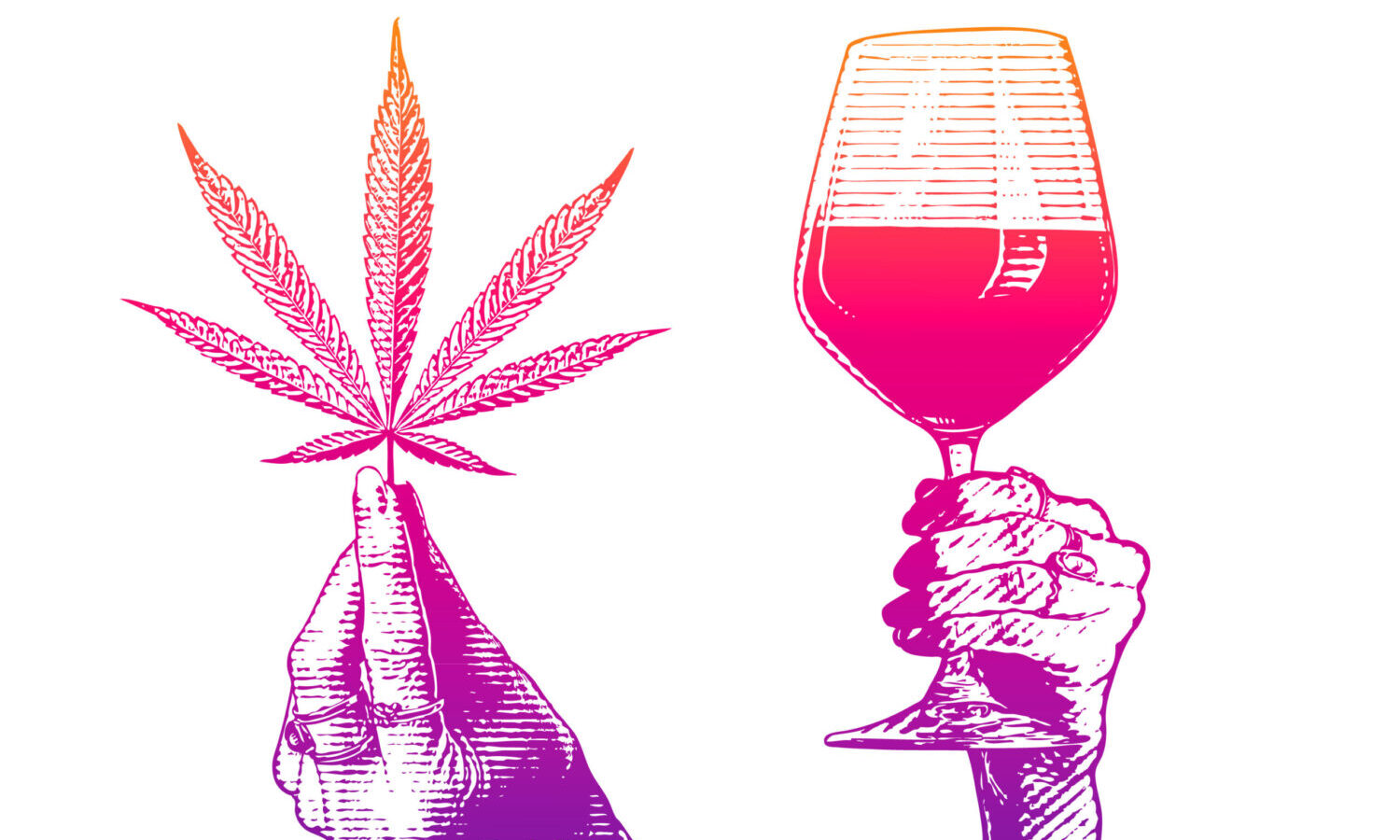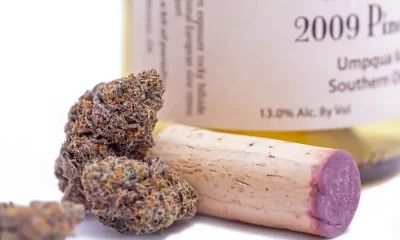Business
Marijuana Vs. Alcohol: How The Two Industries Are Handling Inflation, And What That Means For Consumers

Both industries have their own set of inflation problems, and their own ways of coping. What does this mean for the consumer?
If there are two things Americans can’t escape right now, it’s rising prices and the discussion of rising prices. There is no denying that inflation is dangerously high, with the most recent inflation rate at about 9.1% according to Bloomberg. Still, not all areas of the economy are being affected in the same way. Take marijuana and alcohol, for example.
While the marijuana and alcohol industries have both been hit by rising costs and supply shortages, their prices are not growing at the same rate as many other consumer goods. In fact, marijuana prices are down. But as you look closer at these two industries you can see that just because their prices haven’t immediately skyrocketed does not mean there is no internal struggle. Both industries have their own set of inflation problems, and their own ways of coping.
One major difference between alcohol and marijuana is how it can be purchased and consumed. Marijuana is only legal in certain states, and must be purchased through a licensed recreational or medical dispensary. Alcohol, on the other hand, can be purchased and consumed in a myriad of ways. You can purchase it from the source (a vineyard or distillery), at a wholesale club, retail store, and at a bar or restaurant. All of these different methods of purchase have a different experience, and also a different price.
This wide variety of purchase methods makes alcohol affordable to pretty much all Americans, but rising costs has resulted in a decrease in some of the more expensive ways in which it is normally consumed. According to a poll by Morning Consult, “More than 8 in 10 respondents who say they’ve made adjustments are eating out at restaurants less often. Roughly three-quarters are going to bars less often.” This means that while the alcohol manufacturer may still be able to sell the same amount of product, certain aspects of the industry are suffering.

Many who might have had a few beers at a bar may be more likely to buy a 6-pack on sale at the store instead. This makes any price increases less obvious, since the consumer is likely left feeling like they have saved money when buying beer at a store rather than a bar, even if the price of their beer or wine they purchased has still gone up in price.
Even if alcohol sales have not plummeted as of yet, the cost of doing business is starting to trouble even the most successful alcohol manufacturers. This is not just an American issue either. Take the wildly popular international beer brand Heineken as an example. The brewer’s chief executive, Dolf van den Brink told The Financial Times that, “Across the board we are faced with crazy increases. There’s no model that can handle this kind of inflation.” They are not alone, with overall beer prices already up 4.3% throughout Europe, according to The Guardian.
Marijuana manufacturers, on the other hand, are having a different price problem. Marijuana must be purchased from a licensed dispensary, but increased competition in the legal market and illegal black market competition has made it difficult for companies to raise prices. As we have previously reported, “The cost of cannabis has been declining in many major markets for months, with consumers seeing prices per milligram trending down for most of the year.” As so many other prices rise and rise, the price of weed is getting more affordable.
This might seem like great news for the consumer, and for now it is, but eventually marijuana cultivators will have to pass the rising costs of business on to the consumer somehow. Since increasing prices is currently seen as too risky in the current marijuana market, many large companies have scaled back operations and even laid off parts of their workforce. This also means less variety of product at many stores. So while marijuana may appear to not be affected by inflation when you look at its shrinking prices, if you look deeper you will see the business at its core is struggling to grow.

Marijuana is still a new business, and it is enduring another test from the financial powers that be. Alcohol, on the other hand, has been through prohibitions, recessions and depressions before. This does not mean it does not struggle as much as other industries. It does mean it has a few tricks it has learned along the way, which in addition to being legal on a federal level, gives it a bit more wiggle room to set prices and grow in these times.
Regardless, both industries are reporting profits, maybe just not as much as expected. Perhaps more importantly, both alcohol and marijuana remain affordable for the consumer. That does not mean that one day one or both of these industries might have to raise prices in order to ensure they stay afloat and profitable.
Business
New Mexico cannabis operator fined, loses license for alleged BioTrack fraud

New Mexico regulators fined a cannabis operator nearly $300,000 and revoked its license after the company allegedly created fake reports in the state’s traceability software.
The New Mexico Cannabis Control Division (CCD) accused marijuana manufacturer and retailer Golden Roots of 11 violations, according to Albuquerque Business First.
Golden Roots operates the The Cannabis Revolution Dispensary.
The majority of the violations are related to the Albuquerque company’s improper use of BioTrack, which has been New Mexico’s track-and-trace vendor since 2015.
The CCD alleges Golden Roots reported marijuana production only two months after it had received its vertically integrated license, according to Albuquerque Business First.
Because cannabis takes longer than two months to be cultivated, the CCD was suspicious of the report.
After inspecting the company’s premises, the CCD alleged Golden Roots reported cultivation, transportation and sales in BioTrack but wasn’t able to provide officers who inspected the site evidence that the operator was cultivating cannabis.
In April, the CCD revoked Golden Roots’ license and issued a $10,000 fine, according to the news outlet.
The company requested a hearing, which the regulator scheduled for Sept. 1.
At the hearing, the CCD testified that the company’s dried-cannabis weights in BioTrack were suspicious because they didn’t seem to accurately reflect how much weight marijuana loses as it dries.
Company employees also poorly accounted for why they were making adjustments in the system of up to 24 pounds of cannabis, making comments such as “bad” or “mistake” in the software, Albuquerque Business First reported.
Golden Roots was fined $298,972.05 – the amount regulators allege the company made selling products that weren’t properly accounted for in BioTrack.
The CCD has been cracking down on cannabis operators accused of selling products procured from out-of-state or not grown legally:
- Regulators alleged in August that Albuquerque dispensary Sawmill Sweet Leaf sold out-of-state products and didn’t have a license for extraction.
- Paradise Exotics Distro lost its license in July after regulators alleged the company sold products made in California.
Golden Roots was the first alleged rulebreaker in New Mexico to be asked to pay a large fine.
Source: https://mjbizdaily.com/new-mexico-cannabis-operator-fined-loses-license-for-alleged-biotrack-fraud/
Business
Marijuana companies suing US attorney general in federal prohibition challenge

Four marijuana companies, including a multistate operator, have filed a lawsuit against U.S. Attorney General Merrick Garland in which they allege the federal MJ prohibition under the Controlled Substances Act is no longer constitutional.
According to the complaint, filed Thursday in U.S. District Court in Massachusetts, retailer Canna Provisions, Treevit delivery service CEO Gyasi Sellers, cultivator Wiseacre Farm and MSO Verano Holdings Corp. are all harmed by “the federal government’s unconstitutional ban on cultivating, manufacturing, distributing, or possessing intrastate marijuana.”
Verano is headquartered in Chicago but has operations in Massachusetts; the other three operators are based in Massachusetts.
The lawsuit seeks a ruling that the “Controlled Substances Act is unconstitutional as applied to the intrastate cultivation, manufacture, possession, and distribution of marijuana pursuant to state law.”
The companies want the case to go before the U.S. Supreme Court.
They hired prominent law firm Boies Schiller Flexner to represent them.
The New York-based firm’s principal is David Boies, whose former clients include Microsoft, former presidential candidate Al Gore and Elizabeth Holmes’ disgraced startup Theranos.
Similar challenges to the federal Controlled Substances Act (CSA) have failed.
One such challenge led to a landmark Supreme Court decision in 2005.
In Gonzalez vs. Raich, the highest court in the United States ruled in a 6-3 decision that the commerce clause of the U.S. Constitution gave Congress the power to outlaw marijuana federally, even though state laws allow the cultivation and sale of cannabis.
In the 18 years since that ruling, 23 states and the District of Columbia have legalized adult-use marijuana and the federal government has allowed a multibillion-dollar cannabis industry to thrive.
Since both Congress and the U.S. Department of Justice, currently headed by Garland, have declined to intervene in state-licensed marijuana markets, the key facts that led to the Supreme Court’s 2005 ruling “no longer apply,” Boies said in a statement Thursday.
“The Supreme Court has since made clear that the federal government lacks the authority to regulate purely intrastate commerce,” Boies said.
“Moreover, the facts on which those precedents are based are no longer true.”
Verano President Darren Weiss said in a statement the company is “prepared to bring this case all the way to the Supreme Court in order to align federal law with how Congress has acted for years.”
While the Biden administration’s push to reschedule marijuana would help solve marijuana operators’ federal tax woes, neither rescheduling nor modest Congressional reforms such as the SAFER Banking Act “solve the fundamental issue,” Weiss added.
“The application of the CSA to lawful state-run cannabis business is an unconstitutional overreach on state sovereignty that has led to decades of harm, failed businesses, lost jobs, and unsafe working conditions.”
Business
Alabama to make another attempt Dec. 1 to award medical cannabis licenses

Alabama regulators are targeting Dec. 1 to award the first batch of medical cannabis business licenses after the agency’s first two attempts were scrapped because of scoring errors and litigation.
The first licenses will be awarded to individual cultivators, delivery providers, processors, dispensaries and state testing labs, according to the Alabama Medical Cannabis Commission (AMCC).
Then, on Dec. 12, the AMCC will award licenses for vertically integrated operations, a designation set primarily for multistate operators.
Licenses are expected to be handed out 28 days after they have been awarded, so MMJ production could begin in early January, according to the Alabama Daily News.
That means MMJ products could be available for patients around early March, an AMCC spokesperson told the media outlet.
Regulators initially awarded 21 business licenses in June, only to void them after applicants alleged inconsistencies with how the applications were scored.
Then, in August, the state awarded 24 different licenses – 19 went to June recipients – only to reverse themselves again and scratch those licenses after spurned applicants filed lawsuits.
A state judge dismissed a lawsuit filed by Chicago-based MSO Verano Holdings Corp., but another lawsuit is pending.
Source: https://mjbizdaily.com/alabama-plans-to-award-medical-cannabis-licenses-dec-1/
-

 Business2 years ago
Business2 years agoPot Odor Does Not Justify Probable Cause for Vehicle Searches, Minnesota Court Affirms
-

 Business2 years ago
Business2 years agoNew Mexico cannabis operator fined, loses license for alleged BioTrack fraud
-

 Business2 years ago
Business2 years agoAlabama to make another attempt Dec. 1 to award medical cannabis licenses
-

 Business2 years ago
Business2 years agoWashington State Pays Out $9.4 Million in Refunds Relating to Drug Convictions
-

 Business2 years ago
Business2 years agoMarijuana companies suing US attorney general in federal prohibition challenge
-

 Business2 years ago
Business2 years agoLegal Marijuana Handed A Nothing Burger From NY State
-

 Business2 years ago
Business2 years agoCan Cannabis Help Seasonal Depression
-

 Blogs2 years ago
Blogs2 years agoCannabis Art Is Flourishing On Etsy













